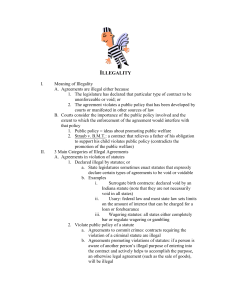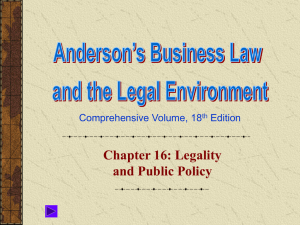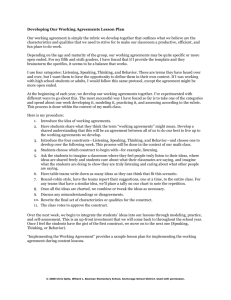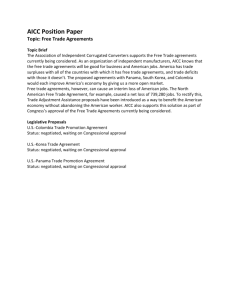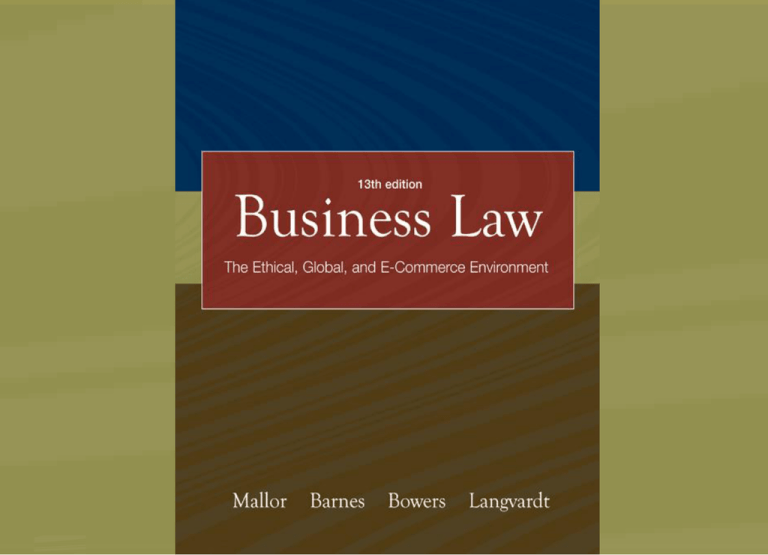
P A R T
3
Contracts
Introduction to Contracts
The Agreement: Offer
The Agreement: Acceptance
Consideration
Reality of Consent
McGraw-Hill/Irwin Business Law, 13/e
© 2007 The McGraw-Hill Companies, Inc. All rights reserved.
P A R T
3
Contracts
Capacity to Contract
Illegality
Writing
Rights of Third Parties
Performance & Remedies
McGraw-Hill/Irwin Business Law, 13/e
© 2007 The McGraw-Hill Companies, Inc. All rights reserved.
C H A P T E R
15
Illegality
“In a free society the
state does not
administer the affairs
of men. It administers
justice among men
who conduct their own
affairs.”
Walter Lippman
Learning Objectives
Meaning
of illegality
Types of illegal agreements
Effect on contracts
Special doctrines
15 - 5
Illegality
An
agreement will be unenforceable
because of illegality if the agreement
involves an act or promise that violates
a law or is against public policy
Even if there was voluntary consent between
two parties who have capacity to contract
Effect:
no remedy for breach of an
illegal agreement
15 - 6
Agreements That Violate
Statutes
Sometimes government legislatures enact
statutes that declare certain types of
agreements unenforceable, void, or voidable
Examples:
15 - 7
New law changes the limits allowed for interest
to be charged on a loan
New law prohibiting creation of a landfill in
environmentally sensitive areas
Agreements That Violate
Public Policy
Agreements
include:
that violate public policy
Agreements to commit a crime
Agreements promoting an illegal purpose
Agreement to perform an act for which the
person is not properly licensed
Agreements in restraint of competition
15 - 8
Licensing Statutes
A common regulatory statute requires a
person to obtain a license, permit, or
registration before engaging in a certain
business or profession
If the purpose of the statute is to protect the
public against dishonest or incompetent
practitioners, then an agreement is
unenforceable if an unlicensed person agrees
to do an act that requires a license
15 - 9
Riggs v.
Woman to Woman, P.C.
Facts & Procedural History:
Riggs joined defendant medical practice
after assurances that the medical practice
was a licensed professional corporation
15 - 10
Employment agreement contained a covenant
not to compete
Riggs discovered that defendant was not a
licensed professional corporation
Riggs v.
Woman to Woman, P.C.
Issue & Court’s Discussion:
Was the employment agreement void
because defendant was not licensed?
Defendant properly attempted to obtain
the license and when it determined it was
not properly licensed, it remedied the
situation and obtained the license
15 - 11
Had operated as a de facto corporation
Riggs v.
Woman to Woman, P.C.
Court’s Analysis & Ruling:
Purpose of the licensing
act is permissive – to
allow a medical practice
the protections of a
corporation; not to
protect the public
Since defendant did
nothing illegal, the
contract is not void
15 - 12
Agreements in Restraint of
Competition
If the sole purpose of an agreement is to
restrain competition, it violates public policy
and is illegal
If the restraint on competition was part of an
otherwise legal contract, the result may be
different because the parties may have a
legitimate interest to be protected by the
restriction on competition
15 - 13
Non-competition clauses
Courts enforce a non-competition clause if:
It serves a legitimate business purpose,
The restriction is reasonable in time,
geographic area, and scope
It does not impose an undue hardship
Example: Jay’s Custom Stringing, Inc. v. Yu in
which the clause was impermissibly broad
and unenforceable
15 - 14
Unconscionable Agreements
Under the doctrine of unconscionability,
courts refuse to grant the equitable remedy
of specific performance for breach of contract
if the contract is oppressively unfair
Unconscionability means the absence of
meaningful choice together with terms
unreasonably advantageous to one of the
parties
15 - 15
Unconscionable Agreements
UCC 2–302 gives courts power to refuse to
enforce all or part of a contract for the sale of
goods or to modify such a contract if it is
found to be unconscionable
Example: Circuit City Stores, Inc. v. Mantor
15 - 16
Company pressured and threatened employee to
sign an agreement to arbitrate in the event of
dispute, but court believe it had gone too far
Clause was unconscionable, therefore the
contract was unenforceable
Contracts of Adhesion
A contract of adhesion is
a contract, usually on a
standardized form,
offered by a party who is
in a superior bargaining
position on a “take-it-orleave-it” basis
Courts will enforce the
contracts unless the term
is harsh or oppressive
15 - 17
Exculpatory Clauses
An exculpatory clause (a release or liability
waiver) in a contract attempts to protect one
party from liability for damages
Exculpatory clauses are perhaps suspect on
public policy grounds, but courts do not
want to interfere with the agreement if it
does not threaten public health or safety
15 - 18
Test Your Knowledge
True=A, False = B
An agreement that promotes violating an
environmental permit is illegal
A person can demand restitution for
breach of an illegal agreement
Non-competition agreements are illegal
agreements
15 - 19
Test Your Knowledge
Multiple Choice
A contract of adhesion:
(a) is always illegal
(b) are contrary to public policy
(c) is a “take it or leave it” agreement
An exculpatory clause:
(a) Protects one party from liability for
damages
(b) Promotes violation of a civil law
(c) Is contrary to public policy and illegal
15 - 20
Thought Question
Do
you think
enforcing noncompetition
clauses in
employment
agreements is
good public
policy?
15 - 21


